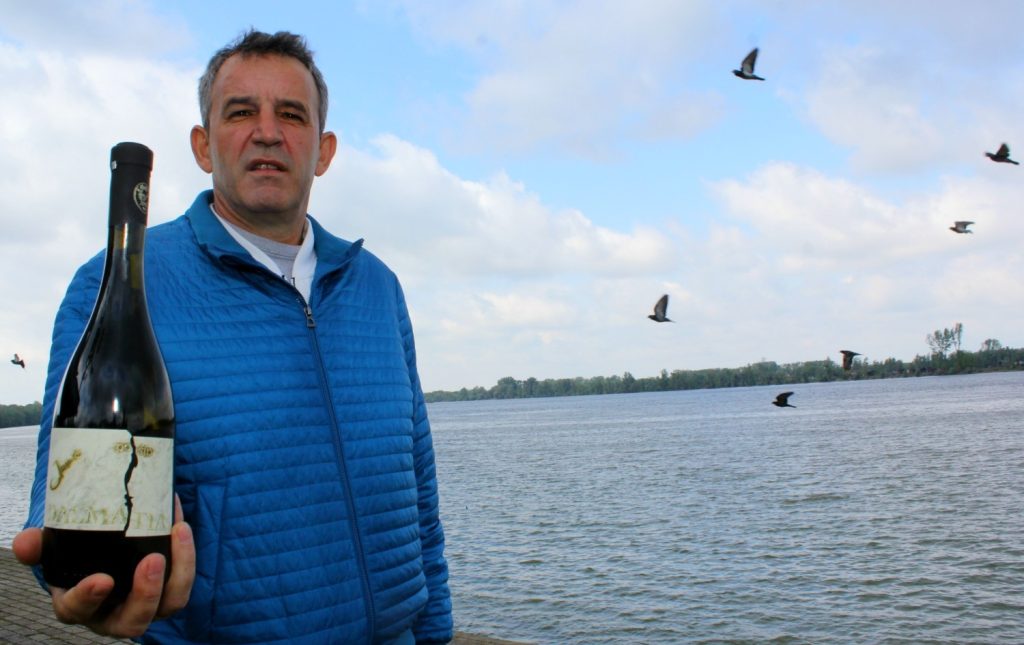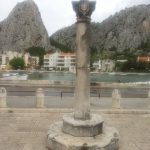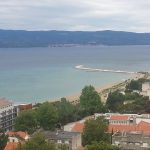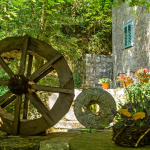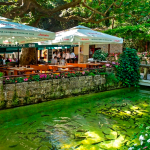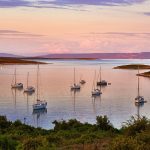Duško Jokić is incredible, the easiness with which this Dalmatian winemaker churns out numbers when speaking of anything is amazing. And it is irrelevant whether he recalls high school times and winning the fourth place in the 400 metre race at some school competition, or the fifth place in the 800 metre race. We are speaking of a time 30 years ago! No matter how he remembers his every performance in anything, it all comes down to the final judgment that he was, in the end, always the winner. So his school from Benkovac, Ivo Lola Ribar, always won, due to his huge contribution with participation in all the races, even at the most prestigious cross races such as the Sportske Novosti Cross in Zagreb or Politika Cross in Belgrade.
“Our school also participated in club athletics competitions and was ahead of Mladost from Zagreb, Crvena Zvezda and Partizan from Belgrade in its category. From my generation I used to often meet the great runner Branko Zorko, whom my best man sometimes defeated, while a great career was made by Borislav Dević from my school, who is still known as the athlete who ran the fastest marathon race in the history of Serbia,” recalls Duško the middle of the 1980s, when he was a high schooler who would often easily swim the distance between Biograd to Pašman Island and back.
He says he could swim as much as is needed even today, as his health and problems with sugar and high blood pressure simply force him into a life of sports and avoidance of stressful situations. Our first attempt at a meeting fell through after he was sick from high blood pressure of 205/125, and the day before our second attempt he also ended up in the emergency room, with medicine to reduce his high blood pressure into normal bodily function.
Duško Jokić came into the world of wine as a super-successful businessman who had just crossed off his previous job, and with a cousin and business partner successfully sold a well-run company. Thus he often meets the question on the “recipe needed to find and run a good business.” His answer is short and clear: “To succeed in work, you must sleep with it!”
“This also means the austerity of the entire family. Every job you do which brings income must be held in your hands. Charisma is needed, there is always risk, but discipline is most important. There is also another side to such a relationship to work, and that is damaged health. I try to fight stress with everyday recreation, but also avoiding early awakenings, which ended with late returns home – everything I do now is to counter traffic. I don’t plan on going to Dalmatia on weekends and to be stuck in a jam at Sveti Rok tunnel or on the highway. This is why I go there in the middle of the week, avoiding the 1st and 15th of the month, Christmas time and between New Year’s and Three Kings, when there are usually crowds – only the opposite!”
Duško Jokić is a businessman from Lišane Tinjske near Benkovac. This is where he began his business story discovering the great business potential in reselling raw leather and medicinal herbs. He had four pre-war years of strong rise.
“I bought raw leather and sold it to large systems, such as Cibalia from Vinkovci and Almeria from Zagreb, and the medicinal and aromatic herbs, mostly sage, went to AgrariaCoop from Zagreb. The business went well. The price of leather was then 10-12 marks for lamb, 7 for calf’s skin, while later it all fell to one mark. Annually I bought and sold 400-500 tonnes of leather. From smaller butchers in Dalmatia I procured the leather, as well as with Jakopec in Zlatar Bistrica, I got plenty from him. I was a bridge, trading house, I would buy, store and then sell to large systems for processing. From Jakopec I took mostly cow leather, and in Dalmatia calf and lamb. But what happened is history, I quickly came into a situation where I had to go to Italy and drive trucks to survive…”
In Italy he lived in Verona, his nose for business soon took him into logistics, and he accepted with both hands the offer from his cousin and later partner to leave for Belgrade and create the messenger service City Express. This is a story to be taught in management schools…
“I would never go back to the delivery business, City Express gave me sugar and lipids and pressure. I did that job for five years, from 2002 to 2007. Someone else can do it now. We were first on the market, we had a messenger service before the state post. At the moment we sold the company, we had 330 delivery vehicles and 537 employees. Our vehicles in Serbia crossed 45.000 kilometres daily. That business is now logistics for my wine story and investment in my native area, as it gave me the conditions to develop the winery and vineyards without bank loans.”
By selling his ownership of City Express, Duško only took a brief one-year vacation. He couldn’t sit at home doing nothing, he went back to Italy and started a logistics business which now sees him living in a triangle – Belgrade, Verona, Lišane Tinjske.
“A man, but also his entire family, needs to stay normal. Regardless of material well-being, a man must work as long as he is alive. Not struggle and slave, but not stop either. Get off the couch and keep working. The logistics I work on now are quite difficult, I travel a lot, but I definitely realise I must not stop, I need to stay in contact with everyone. That’s reality! In Italy I am still tied to a small logistics business, nothing big, but it brings in some income. I regret not living more in Italy before, the climate reminds me of Dalmatia. But again, Dalmatia is Dalmatia. God-willing, I will spend more time in my native land where I spend half a year now, while the other half is in Belgrade or Italy. After City Express, there was around a year of rest to cleanse the organism and move on. I have to include my children and get them used to creating. It comes in tough, but is easily wasted! My duty is to teach my children a true relationship to work and not allow them to become vampires, to stay normal, get involved in the business and begin to create.”
After Duško’s parents returned to their native land, he also began to return more often to visit. He says the conditions are here “for the ancestry to be preserved and renovated.” The village of his childhood, Lišane Tinjske, was known for fruit orchards and as a good place to grow peaches, along with cherries, grapes and strawberries. Duško renovated the local church in his native village, and almost symbolically, not knowing then what his frequent visits to Dalmatia would turn into, he planted the first vineyard in 2009, with Yellow Muškat.
“Then I had no idea that winemaking would become my trademark. All I wanted to do was to give some substance to the land, not to be barren. I bought a parcel from the neighbour as well, and when others heard I bought land, they began to offer me their parcels. I never approached anyone to buy their land! Hectare by hectare vineyards expanded, and in 2012 I decided to go into winemaking. Now it is a somewhat large plantation…”
Duško knew nothing of Yellow Muškat when he planted his first vineyard. He says they were the only seedlings he could find at the time, the name of the variety meant nothing to him. He had only one calculation – the vineyard must secure him and the worker who maintains it a salary. The only thing he knew was economics, and the economic calculation told him that grapes, once they were ready, will be sold for a euro per kilogram.
But Duško’s arrivals to Lišane Tinjske became more frequent after the planting of the first vineyard, and his interest in wine grew. By the time the Yellow Muškat vines came into yield, Duško had already dismissed the idea of selling grapes, his new goal was to build a winery and his own wine story, with a name to clearly state that everything he does is – organic and ecological.
“When I decided to start my own wine story, which was not easy due to large investments, the first thing I did was to hire experts, as I learn from them, I did not go to any school to be a technologist or wine grower. I still claim as an economist that investments are needed in experts, I cannot spray and dig and produce wine, it is up to me to invest and be ready to justify my investments. When I look at the story economically, I must know what I want, and the experts will do theirs. The point is to hire and respect experts, the consultant and technologist and all, to invest in equipment, have cash, as the wine story demands 10-15 years of investments. When I rewind the story and carefully analyse all I did with the winery, I never regret entering it. Maybe because I didn’t have to take out loans. I am enjoying the project, and as for material things, I hope the results will be enjoyed by my children. I have been in the wine story for 8 years, I am still not profitable. These are serious investments, market positioning is required, there are many commitments…”
In other words, although the capacity of his winery, currently at 120.000 bottles, makes him the largest winemaker in the Zadar hinterland, Duško does not stop, stating his investments are only half way. He will soon begin to construct a new winery with a capacity four times higher than the current one.
“So we keep expanding, no going back. I am currently redesigning the winery building, expanding plantations and creating the conditions to produce large quantities, if there is a need for so much wine,” says Duško.
“It is easier to sell wine in the west when it is labelled as ‘organic.’ If I had larger quantities, I could sell them all in the west. This comes with a price. The 2014 harvest gave us no white wine, in 2015 Pošip fell short by 30 percent, as when there is moist weather, fog, dew, rain, we cannot treat it with pesticides. My grapes are not treated with artificial fertilizer, not sprayed with herbicides, we have serious monitoring stations which can always, anytime they want, come and take a sample of soil or leaves, the last control is ahead of the harvest, when there are no more treatments, we are allowed only six kilogrammes of blue stone per 4.000 seedlings and sulphur. If anything else was found, I would lose the certificate!”
Duško’s Maraština is already seen by experts as the foremost edition of that variety, considered indigenous in North Dalmatia. He also proved that Pošip can also yield good results in that part of Dalmatia. He is due to release his first sparkling wine, with a desire to have “some amount of real Prošek.”
Although every sentence he says about his wine story leaves an impression of a man who simply enjoys what he does, Duško does not want to relax for a second and lull himself into his own complacency.
“The wine story, especially in the start, in the crib of creation which lasts 10-15 years, must not be a primary business. It’s an expensive hobby!”
For the original and more from Vinske Priče blog on wine, click here.

